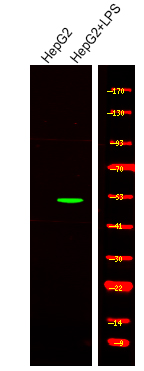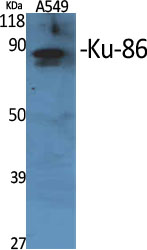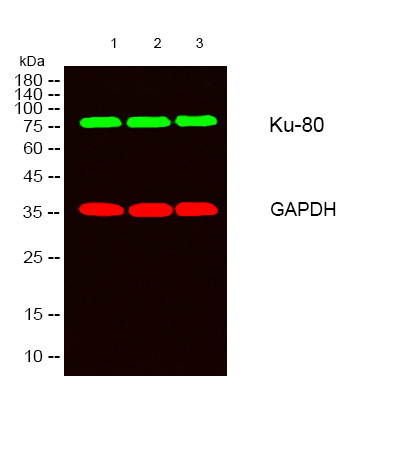Smad1/5/9 (Phospho Ser463+Ser465) rabbit pAb
- Catalog No.:YP1761
- Applications:WB
- Reactivity:Human;Mouse;Rat
- Target:
- Smad1/5/9
- Fields:
- >>TGF-beta signaling pathway;>>Hippo signaling pathway;>>Signaling pathways regulating pluripotency of stem cells;>>Transcriptional misregulation in cancer
- Gene Name:
- SMAD1 BSP1 MADH1 MADR1
- Protein Name:
- Smad1/5/9 (Phospho-Ser463+Ser465)
- Human Gene Id:
- 4086
- Human Swiss Prot No:
- Q15797/Q99717/O15198
- Mouse Gene Id:
- 17125/17129/55994
- Rat Gene Id:
- 59328/85435
- Rat Swiss Prot No:
- P97588/Q9R1V3/O54835
- Immunogen:
- Synthesized peptide derived from human Smad1/5/9 (Phospho-Ser463+Ser465)
- Specificity:
- This antibody detects endogenous levels of Smad1/5/9 (Phospho-Ser463+Ser465) at Human, Mouse,Rat
- Formulation:
- Liquid in PBS containing 50% glycerol, 0.5% BSA and 0.02% sodium azide.
- Source:
- Polyclonal, Rabbit,IgG
- Dilution:
- WB 1:500-2000
- Purification:
- The antibody was affinity-purified from rabbit serum by affinity-chromatography using specific immunogen.
- Concentration:
- 1 mg/ml
- Storage Stability:
- -15°C to -25°C/1 year(Do not lower than -25°C)
- Other Name:
- Mothers against decapentaplegic homolog 1 (MAD homolog 1) (Mothers against DPP homolog 1) (JV4-1) (Mad-related protein 1) (SMAD family member 1) (SMAD 1) (Smad1) (hSMAD1) (Transforming growth factor-beta-signaling protein 1) (BSP-1)
- Molecular Weight(Da):
- 51kD
- Background:
- The protein encoded by this gene belongs to the SMAD, a family of proteins similar to the gene products of the Drosophila gene 'mothers against decapentaplegic' (Mad) and the C. elegans gene Sma. SMAD proteins are signal transducers and transcriptional modulators that mediate multiple signaling pathways. This protein mediates the signals of the bone morphogenetic proteins (BMPs), which are involved in a range of biological activities including cell growth, apoptosis, morphogenesis, development and immune responses. In response to BMP ligands, this protein can be phosphorylated and activated by the BMP receptor kinase. The phosphorylated form of this protein forms a complex with SMAD4, which is important for its function in the transcription regulation. This protein is a target for SMAD-specific E3 ubiquitin ligases, such as SMURF1 and SMURF2, and undergoes ubiquitination and proteasome-med
- Function:
- function:Transcriptional modulator activated by BMP (bone morphogenetic proteins) type 1 receptor kinase. SMAD1 is a receptor-regulated SMAD (R-SMAD).,PTM:Phosphorylated on serine by BMP type 1 receptor kinase.,PTM:Ubiquitin-mediated proteolysis by SMAD-specific E3 ubiquitin ligase SMURF1.,similarity:Belongs to the dwarfin/SMAD family.,similarity:Contains 1 MH1 (MAD homology 1) domain.,similarity:Contains 1 MH2 (MAD homology 2) domain.,subcellular location:Cytoplasmic in the absence of ligand. Migrates to the nucleus when complexed with SMAD4.,subunit:Interacts with HGS, NANOG and ZCCHC12 (By similarity). May form trimers with another SMAD1 and the co-SMAD SMAD4. Interacts with PEBP2-alpha subunit, CREB-binding protein (CBP), p300, SMURF1, SMURF2 and HOXC8. Associates with ZNF423 or ZNF521 in response to BMP2 leading to activate transcription of BMP target genes. Interacts with LBXCOR1.,
- Subcellular Location:
- Cytoplasm . Nucleus . Cytoplasmic in the absence of ligand. Migrates to the nucleus when complexed with SMAD4 (PubMed:15647271). Co-localizes with LEMD3 at the nucleus inner membrane (PubMed:15647271). Exported from the nucleus to the cytoplasm when dephosphorylated (By similarity). .
- Expression:
- Ubiquitous. Highest expression seen in the heart and skeletal muscle.
- June 19-2018
- WESTERN IMMUNOBLOTTING PROTOCOL
- June 19-2018
- IMMUNOHISTOCHEMISTRY-PARAFFIN PROTOCOL
- June 19-2018
- IMMUNOFLUORESCENCE PROTOCOL
- September 08-2020
- FLOW-CYTOMEYRT-PROTOCOL
- May 20-2022
- Cell-Based ELISA│解您多样本WB检测之困扰
- July 13-2018
- CELL-BASED-ELISA-PROTOCOL-FOR-ACETYL-PROTEIN
- July 13-2018
- CELL-BASED-ELISA-PROTOCOL-FOR-PHOSPHO-PROTEIN
- July 13-2018
- Antibody-FAQs
- Products Images

- Western Blot analysis of various,using primary antibody at 1:1000 dilution. Secondary antibody(catalog#:RS23920) was diluted at 1:10000

